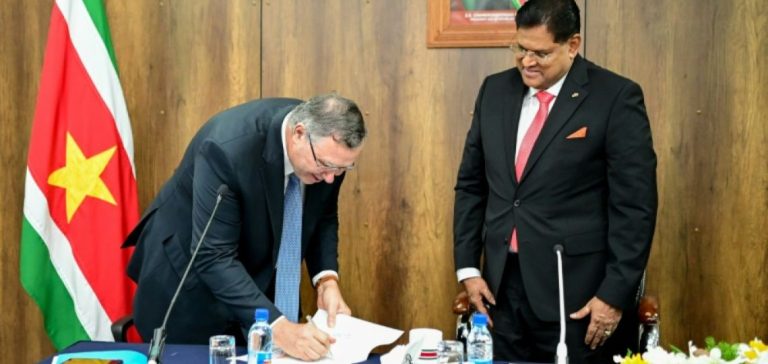TotalEnergies, in partnership with APA Corporation, has confirmed a USD 10.5 billion investment to develop Block 58 off the coast of Suriname. The project aims to exploit the oil resources from the Sapakara and Krabdagu fields, with reserves estimated at over 750 million barrels. The fields, located 150 kilometers offshore, will be developed using a Floating Production Storage and Offloading (FPSO) unit capable of processing up to 220,000 barrels per day.
This investment aligns with TotalEnergies’ strategy to strengthen its presence in Latin America and diversify its offshore assets. Production is expected to commence by 2028. Initially estimated at USD 9 billion in September 2023, the investment has been revised upwards due to increased costs related to securing facilities and optimizing the supply chain.
Significant Economic Impact for Suriname
Staatsolie, Suriname’s national oil company, has the right to acquire a 20% stake in the project. To finance its participation, Staatsolie plans to issue a new series of dollar-denominated bonds in the first quarter of 2025. This financing mechanism is critical to maximizing local economic benefits while allowing the state to capture a direct share of the revenues generated by the oil fields.
Net revenues are expected to reach between USD 16 billion and USD 26 billion over the project’s lifetime, providing a substantial revenue source for a country still in the early stages of economic development. Staatsolie’s involvement in this partnership represents a key step in managing local natural resources and demonstrates Suriname’s ability to attract foreign investment into its energy sector.
Industrial Development and Job Creation
The GranMorgu project is expected to create over 6,000 jobs, including 2,000 direct and 4,000 indirect positions. This initiative is seen as a lever for local industrial development, contributing to the upskilling of the Surinamese workforce. Sectors such as logistics, maintenance, and technical services are likely to benefit directly, boosting economic activity beyond the oil industry.
This development occurs in the context of increased regional competition for offshore energy resources. Companies like ExxonMobil and Petrobras are making significant investments in neighboring Guyana and the pre-salt basin in Brazil, underscoring the need for Suriname to optimize its international partnerships to capitalize on its discoveries.
Strategic Expansion for TotalEnergies
The French operator currently holds a 50% stake in Block 58, with the remaining interest held by APA Corporation. By partnering with local players, TotalEnergies not only secures its exploration rights but also strengthens its foothold in a region with significant potential. This strategy aligns with the company’s broader plan to maximize production in emerging regions while streamlining its investments in onshore projects.
GranMorgu is just one of several initiatives undertaken by TotalEnergies to diversify its portfolio. With multiple exploration licenses in Suriname and similar positions in other Latin American countries, the company aims to reduce its dependence on traditional fields. The economic prospects for Suriname, although dependent on oil price volatility, remain promising due to this transformative project.
Long-term Prospects for Staatsolie
For Staatsolie, this project is a unique opportunity to strengthen its position in the offshore sector. The planned 2025 bond issuance will not only finance its stake in Block 58 but could also support other development initiatives in the region. The long-term goal for the national company is to become a major regional producer, capable of participating in other projects in partnership with multinational firms.
Staatsolie’s ability to attract international capital will largely depend on the success of this bond issuance and the profitability of the field. If the forecasts are met, Suriname could become a regional hub for offshore activities, similar to Guyana, which has recently seen a surge in foreign investment in its energy sector.






















